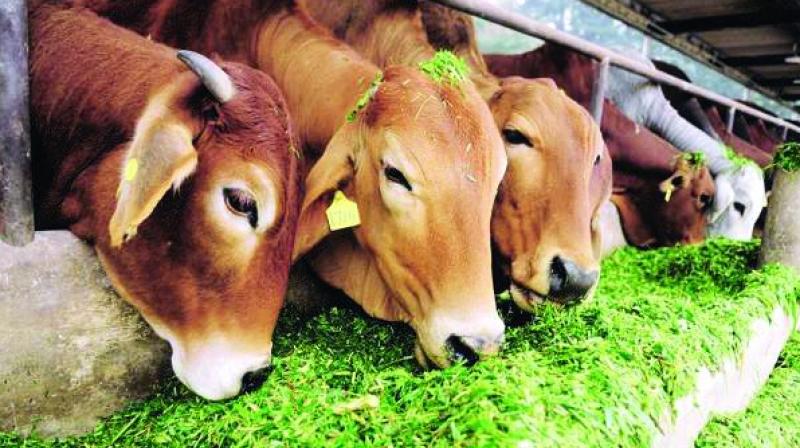Wide Angle: Of cow urine, gaushalas & Cong's future
When a lynch mob in Haryana forced two Muslim boys to swallow a paste of cow dung and urine, they vomited.

Prime Minister Narendra Modi, in his very first speech in Parliament in May 2014, said something which would have struck a chord with a large number of people, including Congressmen who had only silently nurtured the truth under some unstated party discipline.
Mr Modi said the country had to be freed from “1,200 years of ghulami”, or subjugation. It was a historic statement, transformational in its intent.
As it was the beginning of Mr Modi’s innings, one would have expected alert pundits to pick up every inflection and nuance. But no one did. Presumably because Mr Modi had said what most of them kept in their deep heart’s core. Pardon me quoting Ghalib again: “Dekhna taqreer ki lazzat ki jo usne kaha,/ Mainey yeh jaana ki goya yeh bhi mere dil mein hai” (Look at the wondrous flavour of his speech, Whatever he says echoes thoughts that were in the recesses of my own heart).
In other words, Mr Modi had articulated what guilt-ridden Congressmen never had the courage to say openly. Composite culture was attractive when it remained composed in a well-preserved frame. After the fracture of 1947, it was destined to dither, decompose, decay. The terms of endearment had to change. There is evidence scattered all around. Congress leaders like Pandit Madan Mohan Malaviya had distanced themselves from what was popularly recognised as composite culture. A Muslim for him was a “Malech”, an outcast.
In the framework of this composite culture, there were rituals and social practices which were private to the sects respectively. This privacy was mutually respected. What one had for one another was “lehaz”, or accommodation, which was a function of sensitivity. But once notions of majority and minority entered the political discourse, ideas dormant in the subconscious were stoked — India’s prehistoric grandeur, submerged under a Muslim imposition. The expansive, rich cultural commerce forged and knitted over hundreds of years was deliberately allowed to fray, rapidly in the glare of what Niaz Haider called “badsoorat siyasat”, or “indecorous politics”.
Warm admiration of each other was replaced by mere tolerance. Over a period of time “forced” tolerance begins to feel like timidity, surrender. That this latter streak was pronounced in the Congress became clear when senior Congress leader Purushottam Das Tandon outlined a scheme to rename towns and cities which “sounded Muslim”. When he thought of changing Farrukhabad to Farrunagar, Indira Gandhi, raised among Kashmiri Pandits, the heart and soul of Awadh’s composite culture, was livid. In December 1949 she wrote a letter to her father, Prime Minister Jawaharlal Nehru, that if Tandon was not checked in his tracks, she would embark on a unique protest — she would name herself “Zohra Begum”. Indira’s threat remained a joke. But Tandon and his ilk were effective as the thin end of the wedge. The name-changing spree on which saffron-clad Yogi Adityanath has embarked has a long lineage across party lines. Tandon is part of that lineage. In fact, in the licentious canopy of ever-hardening saffron, I am discovering new practitioners, openly demonstrating what was once private. Otherwise I would have had a hint of it earlier.
When a lynch mob in Haryana forced two Muslim boys to swallow a paste of cow dung and urine, they vomited. When I told this story to Murli Manohar Joshi, always civilised in his extremism, he looked at me stoically. The absence of surprise on his face was a matter of surprise for me. “The boys vomited because they did not know the medicinal qualities of gobar (dung) and cow urine,” he said in a matter of fact way. “For certain kinds of fever my mother used to make me swallow tablets of fresh gobar.” It was not a story to be disregarded. In fact, it opened my mind to accept with equanimity dietary rituals which have had a subterranean sanctity for heaven knows how many years, centuries, millennia. My yoga teacher has memories of cow’s urine keeping him warm in Bihar’s harsh winters. Having become shockproof, I did not bat an eyelid when my cook and cricket companion, a Brahmin to boot, listed a series of rituals which would be incomplete without at least token consumption of the stuff. Two litres of cow’s urine is part of Congress leader and former Madhya Pradesh CM Digvijay Singh’s daily diet.
Little wonder then that Digvijay Singh, Kamal Nath and Jyotiraditya Scindia gave pride of place to the commercial production of cow’s urine in the Congress manifesto which they released to the press in Bhopal the other day. To ensure abundant supply, gaushalas or cow shelters will be opened in every panchayat. But there is little mention of it in the media. The announcement has been received as part of routine business. This is my astonishment.
The large-scale revival of an ancient drink will clearly require a CEO with the genius of Varghese Kurien, the founder of Amul. When I saw videos on the social media of dedicated consumers using palms of their hands as cups to drink directly from the source, I had my misgivings. I thought this was the usual fake news trying to denigrate Hinduism. Little did I know that they were promotional videos. Or at least that is the way they come across to me now that the truth has been placed before me at the historic press conference in Bhopal.
It is now clear as daylight that should the Congress win in Madhya Pradesh, and is as good as its word, bottled cow urine has a good chance of driving out other colas from the market, particularly if mahants and sadhus approve a variety of flavours to dilute the pristine purity of the original.
Congress president Rahul Gandhi will then have to take a call — should he or should he not? If the Congress comes up trumps in Madhya Pradesh, it will become difficult for him to discard the beverage for the 2019 campaign.
The real obstacle in the way of Rahul Gandhi leading a credible Hindu party is his ancestry, the popular suspicion that he may have in his genes his great-grandfather Jawaharlal Nehru’s secular distortions or his grandmother Indira Gandhi’s impulsive threat to rename herself Zohra Begum if Farrukhabad becomes Farrunagar. Rahul’s promotion of cow urine as the national beverage will distance him light years away from both.

